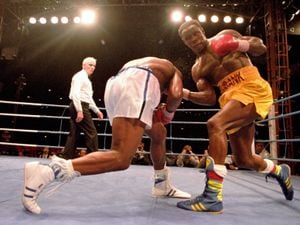Matt Maher: Darren McDermott battling back from the biggest fight of his life
When Darren McDermott tells you he has been through the mill this past decade, he really isn’t kidding.
It is a little more than 10 years since the former English middleweight champion suffered the brain injury which would end his boxing career and change his world almost beyond recognition.
Surviving emergency surgery after a sparring accident left him with a bleed on the brain was only the first battle for Dudley’s McDermott.
The mental scars have proven far deeper than the physical, from the short-term memory loss which has made even the simplest of tasks sometimes feel impossible, through to the anger management issues and bouts of depression.
McDermott describes himself as a happy man but he is not prepared to sugar-coat the details of what he has been through, or pretend greater struggles may not still lie ahead.
“This is something I am going to have to deal with every day for the rest of my life. It’s a constant battle,” he says.
“Every day you wake up with the same frustrations. You just have to keep going as best you can but the problems are never going to go away. It’s something you are always dealing with.”
McDermott, who fought for the British and Commonwealth titles, was on the final day of a sparring session with then world light-heavyweight champion Nathan Cleverly when a right-hand to the head ruptured a previously undetected brain aneurysm.
Yet it was another eight days before the full extent of the injury, initially diagnosed as concussion, became clear. McDermott was rushed to Birmingham’s Queen Elizabeth Hospital to undergo surgery, waking up to be told the devastating news his boxing career was over. That wasn’t the only worry.
“I was told after the surgery to expect some problems with short-term memory loss but that it might clear up within a couple of years,” said McDermott.
“It didn’t and it made things really tough. It’s the little things you take for granted, like remembering people’s names, or being asked to do something and then forgetting what it was only a few seconds later.
“It’s the same as when you put your keys down somewhere and can’t remember where they are. That’s what I’m like every day. I’ve lost four or five phones, left an iPad lying by the side of the road at work.
“It can cause problems, particularly with people you don’t know. When you end up asking their name 20 times they think you’re taking the p***. It’s hard.”
Of even greater concerns were the mood swings and the sudden fits of aggression. The death of his trainer, Dean Powell, in 2013, also hit McDermott hard.
“Dean walked in front of a train. I mean, how do you begin to compute something like that?” he says. “I’d started to have problems controlling my anger, shouting at my wife and kids for no reason.
“I went off the rails. I started drinking, which I’d never done before because I’d always be in the gym training. In the end, I started taking anti-depressants.
“Being told I could no longer box, something I’d been doing since I was eight-years-old, was really tough.
“Even now, a decade on and at 42-years-old, I struggle with it. Boxing was my motivation. Without it, you are left wondering why you bother getting up in the morning?”
McDermott claims it was four or five years before he sought any professional help. In 2018, he also received a significant payout after InHealth Ltd, the company appointed by the British Boxing Board of Control to manage the checking of fighter’s MRI scans, admitted liability for failing to spot the aneurysm five months before his accident.
But while that has made things easier, McDermott points out there is no miracle cure to his condition. The biggest support continues to come from his wife Claire and his three children.
“My wife has been incredible through all of it,” he says. “It is her and the kids that have kept me going. Without them I couldn’t get through it. I know it has been hard for them. Even now if I shout at the kids they are not sure whether I’m being serious or if it is the illness.
“When it comes to mental health you realise there is so much we don’t know. The professionals can help you to a certain point but everyone is different and it is a very individual thing.
“It is very much one day at a time for me and it is likely to always be that way.”
McDermott has not always found it so easy to be candid about his experiences and his words may come as a shock, even to those in boxing circles who think they know him well.
His illness has certainly not hindered the progress of Brooklands Amateur Boxing Club, the gym he initially set up in the back garden of his Woodsetton home in 2011 and which has produced a host of amateur champions, including world bronze medallist Paige Goodyear.
“The gym was a means of me staying in boxing and I’m proud of what we’ve achieved,” he says.
“People might look at you and because they don’t see any physical problem assume you are OK but I’m not embarrassed to talk about what I have been through, the impact it has had on my life. If it helps just one person, then it’s worth it.”
Darren McDermott was speaking during Action for Brain Injury week. Organised by the Headway charity, it runs until Sunday. For more information visit headway.org.uk





